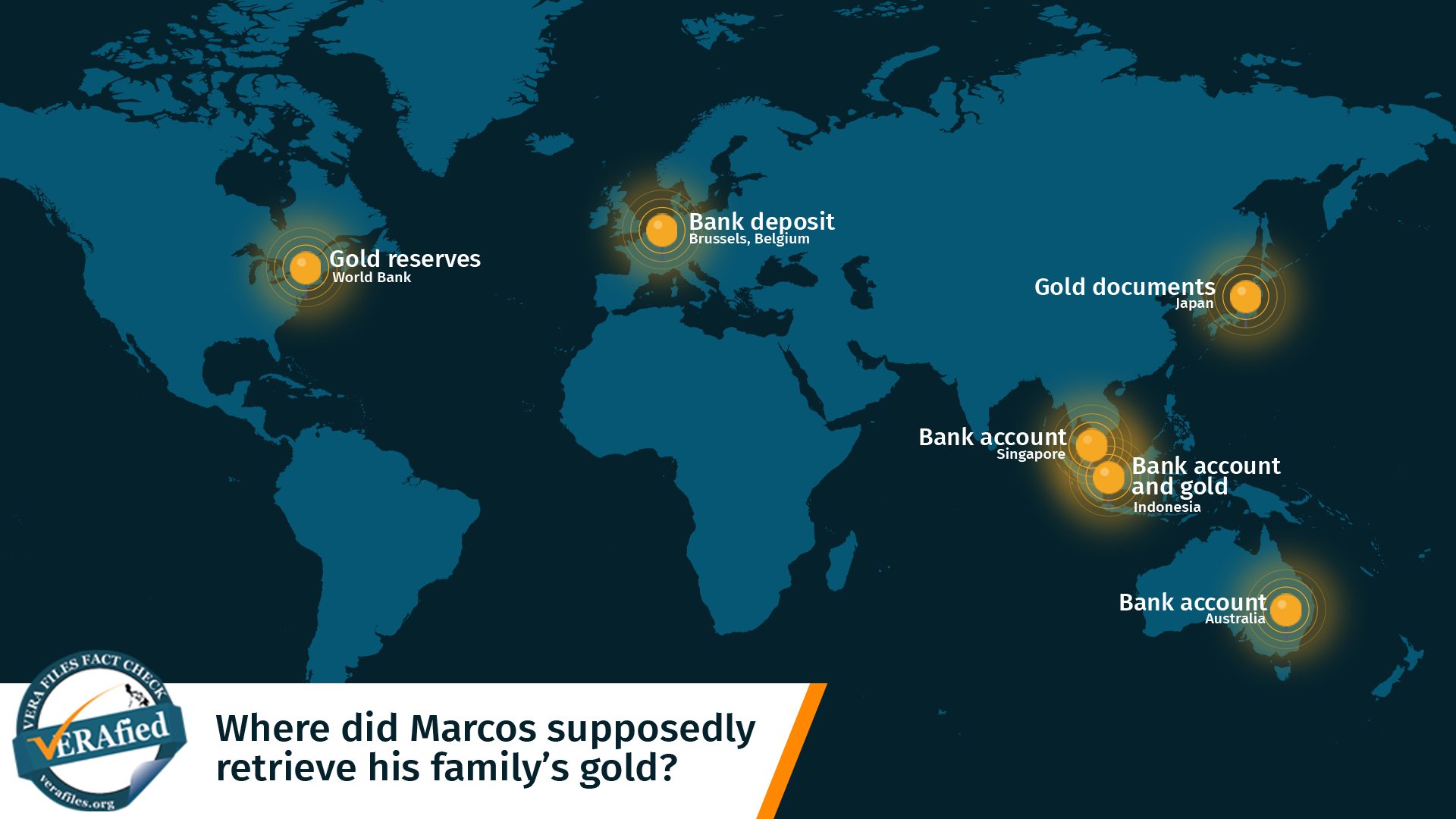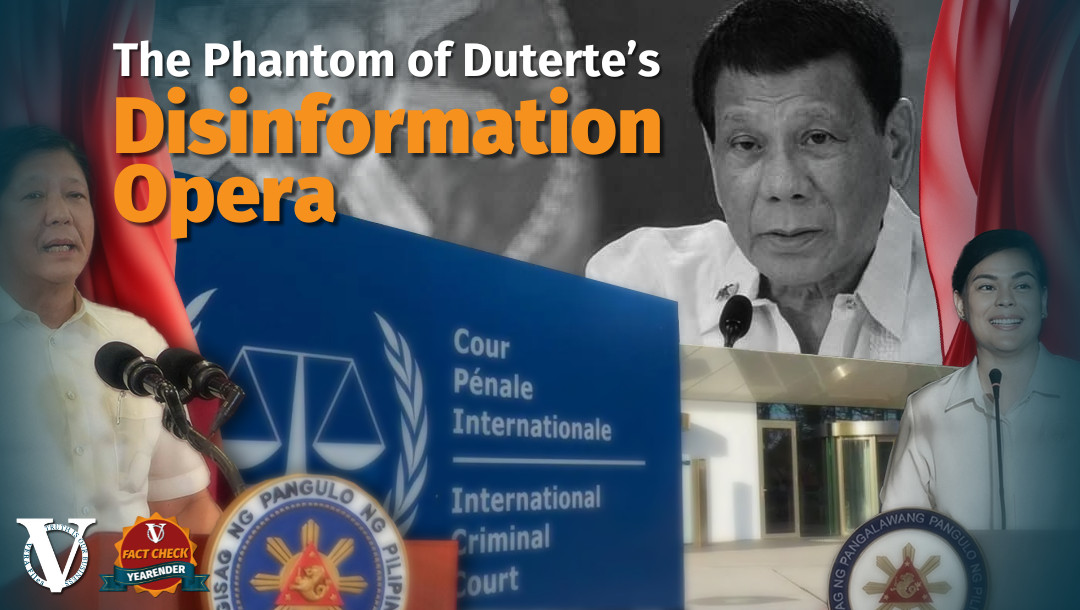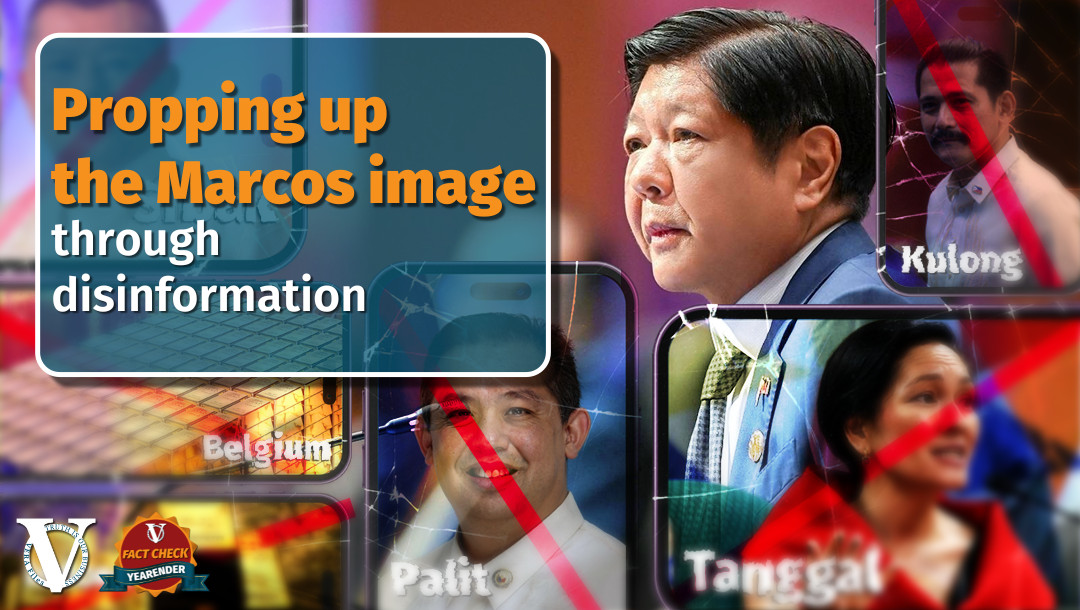(Part 2 of 2) In the social media landscape this year, disinformation peddlers sketched an image of Ferdinand Marcos Jr. as a decisive leader who fired errant officials and as a figure sought by foreign leaders for his wealth.
Spread through clickbait headlines and thumbnails by pro-Marcos accounts, experts say these claims appealed to audiences vulnerable to disinformation in order to sway public opinion in favor of the president.
In 2023, VERA Files Fact Check debunked 23 claims online about Marcos dismissing several government officials and retrieving his family’s wealth abroad, as well as false claims about the purpose of the Maharlika Investment Fund (MIF).
Narratives
One of the most popular narratives portrayed the president as a strongman who punished errant officials that oppose his policies or are not politically aligned with him – much like his predecessor Rodrigo Duterte.
Among the politicians most targeted by false dismissals this year included House Speaker Martin Romualdez, Sen. Risa Hontiveros, and Justice Secretary Jesus Crispin “Boying” Remulla. Seven or almost half of the 13 dismissal claims were about them.
“Common denominator doon sa mga tina-target: May mga clear opposition like Risa… pero kahit yung mga hindi explicit na opposition kay Marcos like for example si Remulla, si Cayetano, hindi man sila explicit opposition pero mas Duterte sila than Marcos,” Maria Elize Mendoza, an assistant professor at the University of Philippines Diliman (UPD) – Department of Political Science, told VERA Files Fact Check in a Dec. 11 interview.
(A common denominator among those who are being targeted: there are clear opposition [figures] like Risa [Hontiveros], but even those who don’t explicitly oppose Marcos like Remulla, [Sen. Alan Peter] Cayetano, they may not be explicitly opposition but they’re more on the side of Duterte than Marcos.)
Romualdez is Marcos’ first cousin, but allegations about him being dismissed as House Speaker appeared thrice. Two claims appeared after Congress realigned confidential funds under the office of Vice President Sara Duterte-Carpio. Another one emerged after he was accused of overspending in foreign trips.
“So ‘yung ganitong klaseng mga contents na parang pinapagalitan si Romualdez ni BBM, [i]t’s trying to counter these claims na nagkaroon na ng problema ang Marcos-Duterte alliance,” Mendoza said.
(So these kinds of contents make it seem like Marcos is reprimanding Romualdez… it’s trying to counter these claims that the Marcos-Duterte alliance is having issues.)
Under Romualdez’s term as House Speaker, Congress denied the allocation of confidential funds to Duterte-Carpio and rumors of impeachment against the vice president emerged.
The videos allow Marcos to distance himself from such attacks against Duterte-Carpio, Mendoza explained.
The president has no power to remove lawmakers from office, yet disinformation about senators and other party-list representatives being ordered removed by Marcos were peddled on social media. Among those targeted were Senators Hontiveros, Robin Padilla, and Alan Peter Cayetano, ACT Teachers Party-list Rep. France Castro, and Kabataan Party-list Rep. Raoul Manuel.
False videos claiming Hontiveros was either removed from office or imprisoned resurfaced old issues against the senator such as her criticism in 2022 about alleged whitewashing in history books, and her involvement in the 2014 PhilHealth bonuses controversy – which the senator and PhilHealth already denied. (Read NO Marcos order to jail Hontiveros over PhilHealth mess).
Disinformation on issues that appeal to the sentiment of the masses had also been noted, such as the West Philippine Sea territorial dispute with China and red-tagging.
After Sen. Padilla questioned the presence of a U.S. aircraft in a resupply mission to Ayungin Shoal in September, a video falsely claimed that Marcos ordered to fire, imprison, or exile him for allegedly expressing support for China.
Mendoza said that such videos could be seen as a counter-attack or cover-up because the senator is popular among the masses and because such a sentiment could “alter people’s mindsets regarding foreign policy supposedly by [Marcos].”
Similarly, the erroneous “sacking” of Sen. Francis “Chiz” Escudero after he criticized the slow punishment of agricultural smugglers could be seen as an act of dispelling potential negative reaction toward the shortcomings of Marcos’ policies, Mendoza said.
As for false claims that Marcos also allegedly fired Castro and Manuel for being part of the communist movement, as implied by a host in SMNI News, Mendoza said red-tagging is an issue that resonates with ordinary Filipinos and vloggers feel it’s popular among pro-Marcos supporters.
Another popular narrative among Marcos loyalists this year was the supposed distribution of the spurious bank deposits and gold reserves allegedly owned by the Marcos family. According to Miguel Paolo Reyes, a researcher from the University of the Philippines Third World Studies Center (UP TWSC), this could be a way to present Marcos as a benevolent figure.
 Claims about the so-called Marcos wealth usually appeared during or after President Marcos went overseas, or when a foreign leader visited the Philippines. VERA Files Fact Check also observed that these claims tend to coincide with local crises or criticism against Marcos’ trips.
Claims about the so-called Marcos wealth usually appeared during or after President Marcos went overseas, or when a foreign leader visited the Philippines. VERA Files Fact Check also observed that these claims tend to coincide with local crises or criticism against Marcos’ trips.
Six of eight erroneous claims about Marcos wealth retrievals were posted at the height of economic issues like worsening inflation and disaster losses, while three other claims emerged after criticisms were made on the expenses and purpose of the president’s foreign trips.
When Marcos went to Indonesia for the ASEAN Summit, a video wrongly claimed that world leaders approached him because of the Marcos gold. Another video falsely stated that a leader of Australia went to see Marcos due to the latter’s wealth.
Such statements evoke the “luluhod ang mga tala (the stars will kneel)” trope where foreign leaders now bow down to Marcos instead of the other way around, Joel Ariate Jr., a researcher of the UP TWSC, said.
Video creators did not present any evidence to back such claims. They merely showed clips of Marcos’ foreign trips or his meetings with world leaders, along with news reports about disaster relief efforts or assistance programs from the government.
Reyes said this could be seen as an attempt to repeat how former first lady Imelda Marcos used to claim that the Marcoses will distribute their wealth to help ordinary Filipinos in times of crises.
“Itong mga pagsabi na pumunta siya d’yan para kumuha ng pera … talagang nare-reiterate siya ng mga taong magco-comment sa Facebook sa ilalim ng kritisismo. ‘Yung mga taong ‘yon, hindi lang salat sa mga pang araw-araw na pangangailangan kundi access din sa information,” Reyes explained.
(These pronouncements that he went there to get money… it really gets reiterated by people who comment on Facebook posts [that criticize the Marcoses]. Those people, not only are they underexposed to basic needs but also lack access to information.)
Apart from Marcos making withdrawals himself, the Maharlika Fund was also portrayed as an institution that would gather the wealth of the Marcoses back to the Philippines.
The Fund, which was established through Republic Act No. 11954, is the country’s first sovereign wealth fund. Operated by the Maharlika Investment Corp., the MIF will be funded by the country’s non-debt financial resources to invest in financial instruments and economic projects.
Disinformation peddlers alleged that the MIF will receive the wealth of the Marcoses from 170 banks across the world and that it will be used to pay off all the Philippines’ debts.
Reyes described the claim as something similar to a money laundering scheme, and that people are still waiting for access to the Marcos wealth.
“Kung may ganyan talaga silang pera nga eh na na-a-access sa ganoong paraan, eh ano pa’ng hinihintay? Supposedly, itong Maharlika ‘yung latest iteration nitong hinihintay na magbibigay sa atin ng access,” Reyes added.
(If they really have that amount of money that can be accessed that way then why the wait? Supposedly, the Maharlika is the latest iteration of this anticipated [thing] that would give us access [to the Marcos wealth].)
But how exactly were these claims presented to people?
Clickbait headlines and thumbnails: Weapons of choice
The narratives above were mainly delivered through clickbait headlines and thumbnails that piqued the audience’s attention.
Certain keywords in such headlines and captions made it look like the information was recent. Other words claimed that Marcos himself allegedly ordered the dismissal of political figures and withdrew money from overseas, or that the MIF would save the country from national debt.
Negative words that convey retribution or insults were used against targeted public officials. Exaggerations like nakakatindig balahibo (gave goosebumps) and napakalaking blessings (extremely huge blessings), and anticipation like heto na (it’s here) and Pilipinas maghanda ka na (Philippines be prepared) were used, on the other hand, for claims about the withdrawal of so-called Marcos wealth.
Clickbait are titles designed to make readers want to click on a hyperlink especially when the link leads to content of dubious value or interest, according to the Merriam Webster Dictionary.
Ariate said clickbait titles came from the old craft of writing showbiz news for tabloids; hence its effectiveness in garnering attention. It is something deliberate and not just thought of out of the blue, he argued.
“Kinakailangan ng certain level of technical skill sa pagbuo ng ganitong mga posts. At alam nila kung sino ang kinakausap nila (A certain level of skill is involved in creating such posts. And [the vloggers] know who they are talking to), Ariate said.
In the 13 erroneous claims about dismissed government officials that VERA Files Fact Check debunked and monitored, different keywords were used to say that they were allegedly fired, expelled, arrested, or kicked out of the country.
Political figures targeted by dismissal claims were also subjected to manifestations of retribution. Bangungot (nightmare) was a word commonly used in the thumbnail texts. Other words or phrases used include wala nang takas or walang kawala (no escape), hindi na nakaligtas (did not survive), napahiya (embarrassed) or sinupalpal (shot down).
Celebratory keywords like oh my god, grabe (intense), and naalarma buong mundo (the whole world was alarmed) were mostly used in claims about wealth retrieval.
Phrases that convey action and anticipation on the Marcos family’s gold or bank deposits such as gagamitin na (will now be used) and sa wakas (finally) were also common.
“’Etong mga vloggers kasi na ‘to sanay sila sa mga clickbait na headlines kahit na wala namang substantial na laman ‘yung videos nila and kahit paulit-ulit lang naman yung mga sinasabi ng different vloggers with different variations of the headline,” Mendoza explained.
(These vloggers are used to clickbait headlines even if their videos don’t say anything substantial and even if the different vloggers’ content say the same thing with different variations of the headline.)
Who exactly are these vloggers, and what kind of information do they publish?
The disinformation peddlers
In both dismissal and wealth claims, VERA Files Fact Check found out that sources are mostly accounts that present themselves as “trending news” pages. A few “reaction channels” also shared both types of erroneous content.
VERA Files Fact Check identified 15 different sources of false dismissal claims on social media, of which 12 are Youtube channels, two are FB channels, and one is a Blogspot website.
YouTube channels BOSS BALITA TV, BANAT KAPANIG TV, PINAS TRENDING NOW TV, and Geryen TV, as well as its FB page Geryen TV Official, claimed to post the “latest news, speeches and interviews” of Marcos or Duterte, as written on their “About” pages.
Among the 15 sources of false dismissal claims, 12 were pro-Duterte, 11 posted pro-Marcos content, while five others posted videos calling to drive away China from the West Philippine Sea.
Of the 12 YouTube channels, FB pages and TikTok accounts that spread spurious claims on the Marcos wealth and MIF, five sources namely NEWSFILES, PweDelieTV, Showbiz Fanatics, PHILIPPINES TRENDING NEWS and another page of the same name claim to show “trending news.”
Four other accounts show support for Marcos and Duterte-Carpio while the rest are netizens’ personal accounts.
Meanwhile, two YouTube channels, WANGBUDISS TV and XCREW, packaged themselves as reaction channels. The vloggers behind these channels repost and add their own commentary on other content created by trending news channels.
For instance, WANGBUDISS TV shared and reacted on content originally posted by YouTube channels PINAS VIRAL NEWS, PINAS NEWS INSIDER, PHILIPPINES TRENDING NEWS, NEWS PH and BANAT KAPANIG TV who propagate trending news.
Why would such pages and channels share erroneous claims about Marcos firing officials, or him withdrawing gold from other countries?
A form of image maintenance
Propaganda, according to Oxford Learner’s Dictionaries, are ideas that may be false or exaggerated to gain support for a political leader, party, etc. In this case, disinformation peddlers want Marcos to be more visible in the public, and to further build his family’s political presence.
Unlike former president Rodrigo Duterte who makes fiery statements against his critics – which make it easier for disinformation peddlers to create videos – Marcos almost does not appear in public or address issues in his administration.
“Aside from making him appear as a decisive leader, it’s a way of bringing him to public attention,” Mendoza said.
Meanwhile, the passiveness in correcting Marcos wealth claims could mean that such propaganda remains beneficial to the Marcos political dynasty, Ariate argued.
“Ang dami pa sa kanilang nagse-seek ng higher position so ito ay valid and continuing propaganda. Tatakbo si Imee, tatakbo ‘yung anak niya. Lahat ng ;yan ay nakaangkla sa pag-ulit ng ganitong propaganda,” he said.
(Many of the Marcos family members are seeking higher positions so this is valid and continuing propaganda. Imee Marcos will run, her son will also run for office. All these are anchored on repeating this propaganda.)
While studies and fact-checking efforts may contain the spread of such claims, Ariate argued that these will continue to perpetuate as long as the government has no systematic effort to counter or debunk them.
“‘Yung intervention sana ng gobyerno na linawin ito, na pabulaanan ang mga bagay ay makakatulong. Hinihintay nating mangyari ‘yun pero hindi nangyayari hanggang sa ngayon,” he added.
(Hopefully, a government intervention to clarify this, to debunk these things would help. We’re waiting for that to happen but it’s not happening until now.)
For a summarized version of our findings, read here VERA FILES FACT CHECK YEARENDER: Propping up the Marcos image through disinformation
Have you seen any dubious claims, photos, memes, or online posts that you want us to verify? Fill out this reader request form.
(Guided by the code of principles of the International Fact-Checking Network at Poynter, VERA Files tracks the false claims, flip-flops, misleading statements of public officials and figures, and debunks them with factual evidence. Find out more about this initiative and our methodology.)






